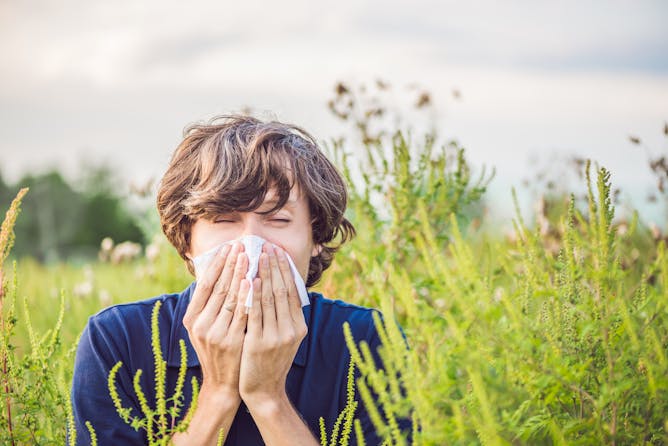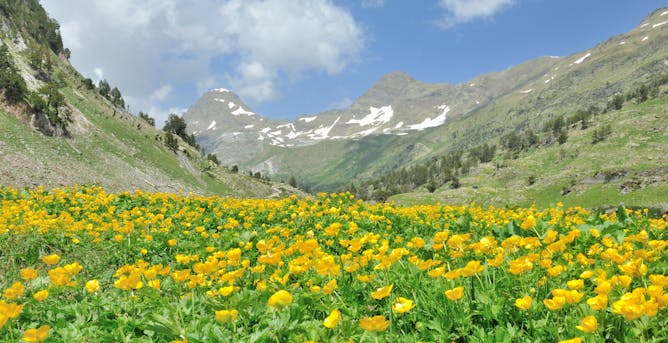|
|
|
Editor's note
|
|
Anyone publishing a book in Spain during the Franco dictatorship of 1939-75 had to accept censorship as an ugly fact of life. Material that was sexual, liberal, anti-Catholic or foul-mouthed was almost always expunged. This should have ended with the Spanish constitution of 1978, yet many censored texts of world classics and Spanish literary landmarks survive in reprints and even retranslations – not only in Spain but throughout the hispanic
world. With the Francoist right again on the ascendant, Jordi Cornellà-Detrell argues that this legacy must be urgently addressed.
For nearly 70 years, pollen counts have been recorded to help allergy sufferers. But while these useful forecasts tell us how much pollen is in the air, researchers have now found that when it comes to the most harmful allergen – grass pollen – it might be the type and not the amount that is more important for those with allergies. Simon Creer and Georgina Brennan explain.
Scientists working in a remote region of the Pyrenees mountains recently discovered microplastic particles that should not have been there. They realised the plastic must have made its way into the atmosphere and then been blown 100km into these pristine mountains. Sharon George and Carolyn Roberts look at how worried we should be about these airborne microplastics.
And check our website or keep an eye on our social media channels today for expert analysis on the Notre Dame fire.
|
Steven Vass
Scotland Editor
|

|
|
Top stories
|

Spanish practices.
Dani Oliver
Jordi Cornellà-Detrell, University of Glasgow
Whenever writings were explicit, liberal or anti-Catholic, the Francoist censors crossed them out.
|

Elizaveta Galitckaia/Shutterstock
Simon Creer, Bangor University; Georgina Brennan, Bangor University
Pollen counts focus on the amount of grains in the air, but it could be the species that are more important.
|

Scientists have found microplastic pollution in once pristine spot near the border between France and Spain.
Nathan Danks / shutterstock
Sharon George, Keele University; Carolyn Roberts, Keele University
New research finds tiny particles in the atmosphere had been carried nearly 100km. Should we be worried?
|
Science + Technology
|
-
Vincent Naude, University of Cape Town; Arjun Amar, University of Cape Town
Scientists now have a better understanding of what martial eagles eat. This is valuable for the conservation of this endangered species.
-
Jonathan Aitken, University of Sheffield
Putting driverless cars on the road safely is hard enough. Doing it in the air is much more difficult.
-
Christopher Manser, University of Warwick
By studying old and dead stars, we can discover what will happen to our sun in the far, far future. And it won't end with a big explosion.
|
|
Education
|
-
Nisreen Ameen, Queen Mary University of London
Conducting research and contributing to knowledge creation might be the only way for academics to sustain their jobs.
|
|
Arts + Culture
|
-
Alessia Grassi, University of Huddersfield
Prada and Louis Vuitton are just two major brand names to make a big play in the art world. But if you are looking for innovation you may be disappointed.
|
|
Business + Economy
|
-
Joris Tieleman, Erasmus University Rotterdam
In economics classes, relentless growth is an unquestioned dogma. Yet this same economic growth is rapidly ripping apart the ecological foundations of our world.
|
|
Politics + Society
|
-
Suzanne Wilson, University of Central Lancashire
Poverty leaves people feeling unable to take responsibility for their future – but community programmes can empower young people to take control.
|
|
| |
Featured events
|

|
Exhibition Space, Emily Wilding Davison Building, Egham, Surrey, TW20 0EX, United Kingdom — Royal Holloway
|

|
St Helens Road, Ormskirk, Lancashire, L39 4QP, United Kingdom — Edge Hill University
|

|
St Helens Road, Ormskirk, Aberdeenshire, L39 4QP, United Kingdom — Edge Hill University
|

|
Brunel University London, Uxbridge, Hillingdon, UB83PH, United Kingdom — Brunel University London
|
|
|
|
| |
| |
| |
| |
| |
|
|
|
|
|
|
|